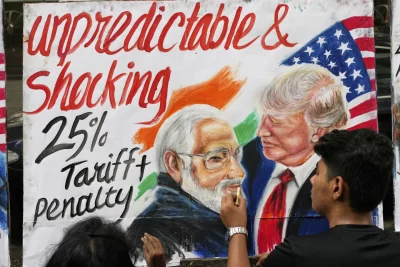
A suspended New York City police officer who had been accused — then later cleared — of spying for China is fighting to be reinstated, but the department wants him fired for refusing to be interrogated by the bureau of internal affairs exploring possible disciplinary action.
The fate of the officer, Baimadajie Angwang, now rests with an NYPD disciplinary judge who is considering arguments made before her Tuesday.
The police department argues Angwang should be fired for insubordination, saying he willfully disobeyed orders to submit himself to questioning in June. That came two months after Angwang filed a lawsuit against the city saying he was wrongfully arrested when he was taken into custody in September 2020 by authorities with guns drawn as he prepared to report for duty at his Queens precinct.
The U.S. Attorney’s Office announced Jan. 19 that it was dropping all spying charges against the officer, saying prosecutors had uncovered new information warranting their dismissal. That ended a two-year ordeal for Angwang, a naturalized U.S. citizen born in Tibet, who had been accused of spying on expatriate Tibetans in New York on behalf of officials at the Chinese consulate in the city.
Despite his long legal ordeal, Angwang said on the stand Tuesday that he still wants to rejoin the force.
Angwang said he refused to appear at the June 5 questioning because he was advised that the order was unlawful because his new attorneys were denied additional time to confer with him and get up to speed with the case. Police also rejected requests for a witness list and other documents ahead of the hearing, which was to focus on any wrongdoing that warranted discipline because of his interaction with Chinese officials in New York.
The lawyer representing the police department, Penny Bluford-Garrett, argued that “taking orders” was part of the job, and that the department’s internal affairs bureau “can investigate you for anything.”
The U.S. attorney’s office in Brooklyn had initially claimed that Angwang began working as an agent for China in 2018 and was secretly supplying information on Tibetans pushing for their homeland’s independence from the communist government. It said he had worked to locate potential intelligence sources and identify potential threats to Chinese interests.
Tibet has been an especially sensitive issue for communist China.
There was no allegation that Angwang compromised national security or New York Police Department operations.
Angwang, 37, was assigned to an NYPD precinct in Queens as a community liaison.
“Does he deserve to lose his job? The answer to both questions is absolutely not,” said his lawyer, Michael Bloch.
Instead, he said, the department should say, “Thank you for your service, sir, and welcome back.”
Angwang’s lawyers, however, contend that the interrogation was a setup to entrap the officer, despite having his federal case dropped by the Justice Department earlier. An internal affairs lieutenant testified that he had prepared a list of 1,700 questions for Angwang.
Angwang was first notified on May 17 to appear five days later for questioning. But his attorney got a postponement until June 5, giving Anwang time to find new attorneys.







